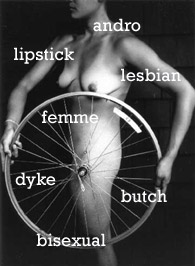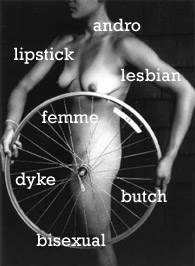You step into the local lesbian club.
The sound of booming dance music surrounds you.
The bar beckons.
As you walk towards the bartender or the dancefloor, you can feel a thousand eyes watching and assessing your entry into the club - carefully scrutinising your dress style, your hairdo, your gait etc.

You might be the type who likes this kind of attention, or you might not be. But at moments like these, what's undeniably is that you have already been "labelled" by the people around you.
The labels that are being heaped upon you are pretty obvious: what label do you subscribe to? Are you fat, skinny or athletic in build? Are you cute, just average, or plain ugly? The list goes on.
Yet every label that is assigned is really based on individual preferences: some people like skinny while others might not. It's just like the saying goes: "One man's meat is another man's poison". (Though in the case of the lesbian community, one woman's femme is another woman's pure lesbian).
So what is labelling? It could be said that labelling is one common method of discrimination practiced in the lesbian community. It is a common idea that when it comes down to labelling, butches are supposed to be with femmes, or else femmes should be with femmes - in which case they will be considered lipstick lesbians. Or maybe not, depending on varying individual ideas on how women should be.
The advent of androgyny for men and women alike in the greater world brought a newer perspective into labelling for lesbians - that of the andro woman, the one who falls between the cracks, being neither butch nor femme.
Ironically, the one, who, in the past, persisted in defying any sort of categorisation, has finally been categorised, and a new label created.
There is also the occurrence of yet another label used by some lesbians in Singapore and Malaysia - the pure lesbian. Who is the pure lesbian? What does she look like?
Such a label is commonly associated with lesbians who want to maintain that they are the true lesbians - the women who are emotionally and sexually attracted to other women, who don't have to play out gender roles of masculine or feminine in order to attract a same-sex partner.
But the term 'pure' is perhaps rather misleading since the definition of a pure lesbian is so much similar to the definition of a lesbian. So why not just simply call a pure lesbian a lesbian?

Aside from discrimination based on labels, there are other ways in which lesbians are discriminated against. Often these other ways prove to be baseless or unnecessary due to varying degrees of ignorance on the rejecting party.
Another friend of mine, X, told me this scary story about how she'd been chatted up by someone on the Internet Relay Chat channel that they both frequent.
After several conversations, they both agreed to meet up and exchanged phone numbers. On the day of the meeting itself, when that person called X up to reconfirm, X coolly mentioned that she was Malay.
According to X, there was some hesitance from the other party, who later asked: "You're Malay?" to which X said yes. X only realised that something was non-kosher when, an hour before their meeting, the person called her up to cancel their date, giving excuses that sounded far too convenient at the time. X felt that whatever her reasons may be, she was discriminated against because of her race.
Another bisexual friend of mine from Perth recounted an incident where she and a lesbian friend, Y, had met some people at a club on a lesbian night. There and then, she experienced the differences between how she, as a bisexual, was being treated differently from her lesbian friend Y by fellow queer women.
While they embraced Y with all the grace and spirit of sisterhood, they completely ignored my friend, treating her as irrelevant to the community, perhaps thinking that my friend was either straight or bisexual. Either way, she was irrelevant to them.
"It's a community-cohesion thing," says Joanne, a psychology graduate from Sydney," A community group, in order to feel that they are a group, needs outsiders.
Outsiders are those who don't conform, either by clothing or appearance. Therefore it is the nature of the community - and the fact that it exists as a solid, cohesive community..."

Frankly, the chances of meeting a potential partner are already so limited for the lesbian community. Yet if we persist in narrowing our choices down with labels, we would, in the end, only further restrict our choice of life partners.
Having said that, in some cases, discrimination is often a necessary evil, especially if the future of one's happiness is involved.
While there are those out there who say that they would never discriminate based on looks, and that personality is everything, it is human nature that the initial reaction is to be drawn to things that please the eye.
What comes after the initial attraction depends on what the eye finds below the surface. Even for the rejected party, a brush with discrimination can become a positive learning process that brings one closer to understanding what she wants.
Thankfully, as a community, we are becoming more aware of the various labels used against us. And with increased awareness, we can focus our efforts toward combating such labels of discrimination.
We ask that we be given equal rights as human beings, yet we still label members of our community like canned food i.e. what's good for you and what's not (even if you haven't tried it before).
We are quick to judge heterosexuals for treating us like misfits of society, yet some of us within our community would not hesitate to dismiss, or in extreme terms, reject, those who aren't what we want them to be.
And if we are guilty of discriminating against our own, how can we expect society at large to be more accepting of us?











 Printable Version
Printable Version











Reader's Comments
Be the first to leave a comment on this page!
Please log in to use this feature.